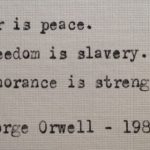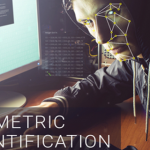The Fallacy of ‘You Have Nothing to Fear if You Have Nothing to Hide’

Privacy is something valued by all of us, at least to some degree. Arriving home at the end of the day, it’s important to know that what goes on behind closed doors is not being monitored by authorities or some other party.
Equally, we may not want all of our personal communications with friends, partners and family members to be available without proper justification by some government employee, or our intimate images to be accessible to others without our consent.
In the 1949 novel Nineteen Eighty-Four, George Orwell imagined a dystopian future where telescreens monitoring citizens in both the public and private realms were ubiquitous. And while this idea might send shivers down the spine, the reality is that it’s not far from the truth in 2018.
Indeed, authoritarian leaders of days past could only have dreamed about having access to information as private and pervasive as metadata and the vast amounts of personal information contained in our mobile phones and other devices.
The use of CCTV cameras in public places has been well-established in this country for decades now. And soon, these cameras are set to be linked to a national database containing all Australian driver licence and passport photos, enabling almost-instantaneous biometric matching.
The 2013 Snowden leaks revealed just how far-reaching government digital surveillance has become, along with its deep encroachment upon people’s privacy. The documents revealed that the NSA, along with other Five Eyes nations, were involved in colossal global surveillance programs on their own people.
It doesn’t bother me
Many in the community simply shrug off the ever-increasing whittling away of the basic right to privacy, as it’s supposedly being carried out in the name of protecting us against terrorists. “If you’ve got nothing to hide,” they assert, “then you’ve got nothing to fear.”
But these people may want to think again, as the removal of a basic right is incremental, and, once it’s gone, the legislation and policies that withdrew it can be very hard to knock down.
Distorting the discussion
Chair of the Electronic Frontiers Australia policy team Angus Murray said the nothing to hide argument is a “fundamentally dangerous” proposition, as it creates the premise that “privacy is only invoked where criminals are involved.”
“Unfortunately, the nothing to hide rhetoric has created a situation where this fundamental right has been somewhat distorted,” Mr Murray told Sydney Criminal Lawyers®.
According to him, the starting point to the argument should not be grounded in “criminality or the criminal justice system,” but “rather it should be about a fundamental human right not to be subject to arbitrary interference in private life.”
“This is particularly pervasive in the context of mass surveillance,” he continued, “wherein law-abiding citizens have their private life, often unknowingly, interfered with on the pretence that this is in their best interest, or more correctly, it’s not in their worst interest.”
And the digital rights advocate should know. Electronic Frontiers Australia has been at the frontline of monitoring the encroachment upon the rights of Australians in the digital environment since 1994.
The Australian right to privacy
Article 17 of the International Covenant on Civil and Political Rights enshrines the right to privacy in international law. Being a signatory to the agreement, Australia has committed to uphold the rights contained in the document at the international level.
But, at the domestic level, Australia doesn’t have a bill guaranteeing citizens’ basic rights under the law, and therefore there is no general recognition of privacy being a fundamental right. Indeed, Australia is the only democratic nation in the world without a national bill of rights.
The federal Privacy Act 1988 is the principle piece of legislation protecting Australians’ personal information, although, it’s long been criticised for providing inadequate protections against data breaches.
The Office of the Australian Information Commissioner is the body responsible for enforcing the provisions of the Act. It announced last month that the federal Department of Health had breached privacy laws after it published de-identified health records of 2.5 million Australians online.
It was subsequently found the data could be re-identified. And the commissioner made the announcement a year and a half on.
Your life’s in a databank at ASIO
The federal Coalition government has been implementing policies that have grave implications for citizens’ privacy. Its mandatory data retention regime, which requires all telcos and ISPs to store their customers’ metadata for the period of two years, came into effect on October 13 2015.
The metadata that is stored relates to the time and date of calls, emails, text messages and internet sessions. It reveals who an individual has been in contact with, and their location at the time. And privacy experts warn that a lot can be ascertained about a person via this information.
Currently, warrantless access to this data is reserved to 21 law enforcement agencies led by ASIO.
Mass surveillance
On October 5 last year, all state and territory leaders signed off on the Turnbull government’s National Facial Biometric Matching Capability, which is a database that will store all Australians’ drivers licence and passport photos.
This mass hoarding of most of the population’s images will then be linked up through an exchange, so that it can be instantaneously macheted to identify people captured on CCTV cameras in public places.
The legislation to enact this system was introduced into parliament last month, and is currently under the review of the joint parliamentary committee on intelligence and security. When the program was announced, the prime minister claimed it had nothing to do with mass surveillance.
And in July last year, Turnbull said his government was proposing new laws that would require social media and technology companies, such as Facebook and Google, to allow Australian security agencies access to people’s encrypted messages.
Staring into the sun
Those who simply scoff at this encroachment upon our privacy, declaring that they have nothing to hide, are missing the point. If you mine any individual’s data in a thorough way, it’s sure that you’ll find something that looks suspect.
The deniers are similar to climate change sceptics. Long-term changes to weather are almost imperceptible on a daily basis, just like the erosion of the right to privacy, so the benefits of new technologies are easy to utilise, whilst refraining to consider the detrimental impact they’re having.
Equating privacy with guilt
“Too many wrongly characterize the debate as security versus privacy,” US computer security expert Bruce Schneier explained. “The real choice is liberty versus control.” And with a network of CCTV cameras linked to facial recognition technology, the ability of authorities to control will be overwhelming.
As far as Murray is concerned, the nothing to hide argument sets off the debate around privacy on “an ill-founded footing,” as those who are most vocal about the need for the right to privacy to be upheld are somehow cast as suspects.
“A person does not require something to hide to care about their privacy and the burden should not be reversed onto citizens to demonstrate that they have nothing to hide,” Mr Murray concluded.
“This should be a matter for law enforcement in the course of lawfully obtaining a judicial warrant.”







